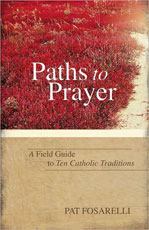"The method of personal prayer that uses the discipline of spiritual reading as its foundation is called lectio divina, or 'holy reading.'
"Lectio divina is not simply spiritual reading. Rather, it is a structured way to meet God in scripture. Classic lectio divina had five steps, while the more modern version adds a final, sixth step. The steps of lectio divina are:
"Silence: Silencing one's body as well as one's mind is key. We must be both interiorly and exteriorly silent if we are to hear God speaking through what we are reading. In many ways, getting rid of external noise is easier to accomplish than getting rid of all the anxieties in our minds. Yet, both must be minimized if we are to hear God. Our world and our minds are loud, busy places. It will take a while to learn to quiet them.
"Reading: We then read a scriptural passage; it may be just a few words in length. We are not to read for speed or to cover much material. Rather we are to read slowly, savoring each word, reading the passage as the passage reads us. Does that sound strange? It isn't strange at all if we can recall a time when we read a passage that seemed to have been written expressly for us, a passage that spoke to us in just the way we needed. Much of scripture can be experienced this way, but this is much more likely to occur if we take the time to slow down.
"Meditation: After reading the passage, we reflect on it, perhaps even imagining ourselves as a character in it. In other words, we try to imagine what was going on so as to precipitate the event described in the passage or to evoke the passage's meaning.
"Prayer: We then pray over the passage, asking God to reveal to us whatever message God would have us take from it. This is a brief prayer, something like, 'Help me to be open to what you would have me learn.'
"Contemplation: We then quiet ourselves and permit God to speak to us. The goal is to empty ourselves of our own preconceived notions of what we are to take from the passage, and instead open ourselves to God's word of love to us.
"Incarnation: In this later-added step, we live out what we have learned by doing concrete acts of service in the world.
"Lectio divina is a spiritual practice in which any of us can engage. Although it requires time and discipline, its benefits far outweigh the sacrifices we might have to make to dedicate ourselves to it.
"As an example of lectio divina, let's say that the passage we are encountering is the post-resurrection story of Jesus' encounter with Peter from the Gospel of John (Jn 21:15-18). In that passage, Jesus asks Peter three times if Peter loves him. Peter responds in the affirmative each time, but prior to responding the third time, scripture tells us that Peter was 'hurt' that Jesus had asked him the question three times. As we use this passage for lectio, we would first enter into external and internal silence. Then, we would read the passage carefully and slowly, letting it 'read' us. In other words, we would look for what 'jumps out' at us from this story. After that, we might meditate on the encounter between Jesus and Peter. How would we have felt if we had been Peter, who had denied Jesus three times (after swearing he would not do so just a few hours prior to his denial), and now was being asked repeatedly whether he loved Jesus? Have we denied Jesus? How would we feel if Jesus asked us repeatedly whether we loved him? Following this, we might pray briefly, asking God to permit us to receive from this gift of scripture what God would have us receive. Then, we become quiet, giving God the space and time to speak to us. We might end the lectio with the Lord's Prayer, and then commit ourselves to demonstrating our love for Christ in a tangible way."
